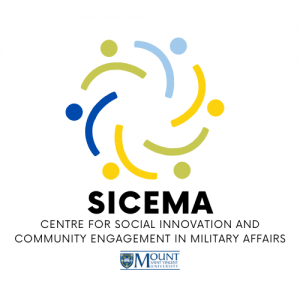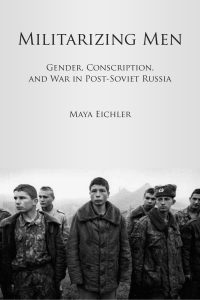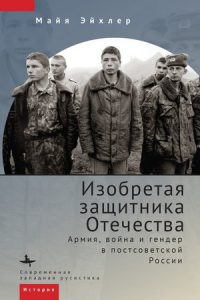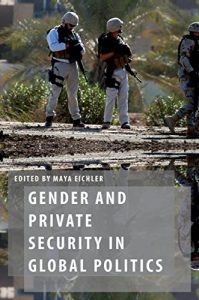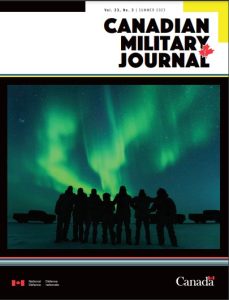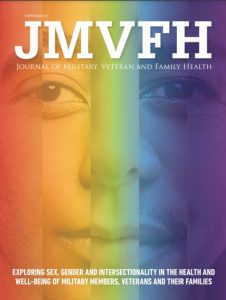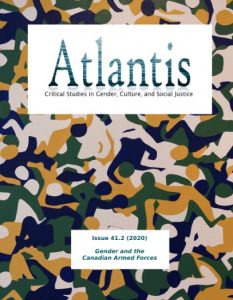Publications
Speaking Up: New Voices on War and Peace
in Nova Scotia
Edited by Maya Eichler, Reina Green and Tracy Moniz
Speaking Up: New Voices on War and Peace in Nova Scotia brings many previously neglected voices to the fore — voices of current members of the Canadian Armed Forces and military veterans, members of the African Nova Scotian and Mi’kmaw communities, refugees and immigrants displaced by war, historians and other academics who study war and militarization, artists who reflect on war’s impact, and peace activists who vigorously protest against the militarization of the region.
Militarizing Men: Gender, Conscription, and War in Post-Soviet Russia
By Maya Eichler
A state’s ability to maintain mandatory conscription and wage war rests on the idea that a “real man” is one who has served in the military. Yet masculinity has no inherent ties to militarism. The link between men and the military, argues Maya Eichler, must be produced and reproduced in order to fill the ranks, engage in combat, and mobilize the population behind war.
Get a copy of Militarizing Men (English)
Militarizing Men is also available in Russian Translation from the Academic Studies Press.
Read Militarizing Men open access (Russian translation)
Get a copy of Militarizing Men (Russian translation)
Gender and Private Security in Global Politics
Edited by Maya Eichler
Gender and Private Security in Global Politics brings together key scholars from the fields of international relations, security studies, and gender studies to argue that privatization of military security is a deeply gendered process. This is the first book to develop an extended feminist analysis of private militaries and to draw on feminist concerns regarding power, justice and equality to consider how to reform and regulate private forces.
Get a copy of Gender and Private Security in Global Politics
Transforming Military Cultures, special issue of Canadian Military Journal (Summer 2023)
Guest edited by Maya Eichler, Tammy George, and Nancy Taber
With this special issue we provide readers with insights and recommendations for meaningful military culture change. This special issue grew out of two TMC panels at the 2022 Inter-University Seminar on Armed Forces and Society (Ottawa, Canada). These panels were titled Transforming military cultures: An educational and leadership lens and Transforming military cultures: Identity and organizational change. Several panelists, as well as others interested in transforming military cultures, have contributed to this issue. The articles in this special issue discuss research on root causes, lived experiences of racialized military personnel, contested military identities, familial norms, critical feminist education, and trauma-informed pedagogy as they relate to transforming military cultures (“Editorial: Transforming Military Cultures,” p. 4).
Read the CMJ special issue (Vol. 23, No. 3)
Exploring Sex, Gender and Intersectionality in the Health and Well-Being of Military Members, Veterans and their Families, special edition of Journal of Military, Veteran and Family Health (September 2021)
Guest edited by Maya Eichler
This special issue explores the health and well-being of military members, Veterans, and their families through a focus on women, sex, gender, sexuality, and intersectionality. The contributions to the special issue advance analysis in this research field and examine implications for policy and practice in military and Veteran communities. With contributions from Canada, the United States, the United Kingdom, and Israel, this special issue showcases cutting-edge international scholarship and points to future directions in the mainstreaming of sex, gender, and intersectionality throughout military, Veteran, and family health research (“Guest Editorial: Seeing Sex, Gender, and Intersectionality in Military, Veteran, and Family Health Research,” p. 2).
Read the JMVFH special issue (Vol. 7, No. s1)
Gender and the Canadian Armed Forces, special issue of Atlantis: Critical Studies in Gender, Culture & Social Justice (Fall 2020)
Guest edited by Maya Eichler
This special issue includes the voices of CAF servicemembers and veterans—both through the qualitative research presented and the perspectives of those contributors who are themselves former military members. This speaks to the feminist conviction that we must hear the voices of those most affected by, and embedded within, the world we seek to understand and change. Today’s feminist scholarship goes beyond earlier feminist debates that were polarized between advocating for women’s “right to fight” and opposing women’s cooptation into militarism. Today’s generation of feminist scholars is engaged in the daunting task of critiquing, and even opposing, militaries while also engaging with them more deeply than ever (“Gender and the Canadian Armed Forces: Does Change Mean Feminist Progress?,” p. 7).
